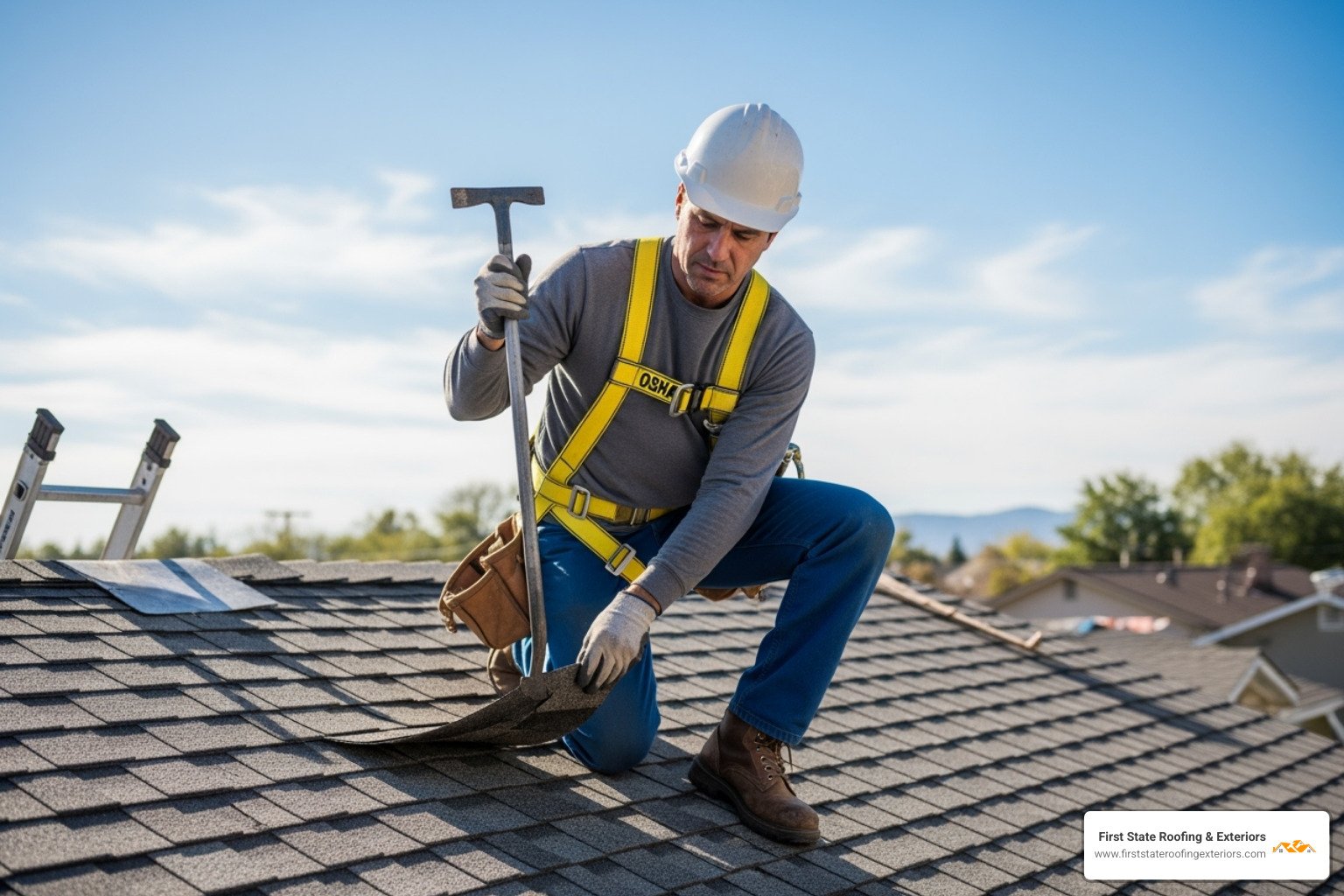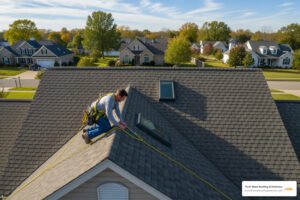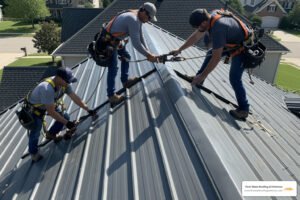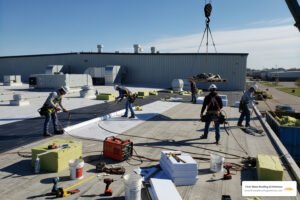Why Finding the Right Roofer Matters for Your Home
When you need to find a roofer, the stakes are high. Your roof protects everything you value, and choosing the wrong contractor can lead to costly repairs, safety hazards, and frustration. This guide simplifies the process, providing a clear roadmap for hiring a top-tier professional. For Delaware homeowners seeking reliable roofing and exterior services, working with established local contractors is the first step toward peace of mind.
Quick Steps to Find a Reliable Roofer:
- Get at least 3 estimates from licensed, insured contractors.
- Check references and reviews from recent customers.
- Verify licensing and insurance with your state registrar.
- Ask about warranties on materials and workmanship.
- Avoid high-pressure sales tactics and door-to-door solicitors.
Typical roofing repairs cost $380 to $1,800, while replacements average $5,890 to $12,800. With labor making up about 60% of the total cost, choosing skilled professionals is essential. Hiring an unlicensed contractor can result in poor workmanship, code violations, and expensive future problems.
With a systematic approach, you can identify contractors who will protect your investment for decades. As the owner of First State Roofing & Exteriors with over 20 years of experience, I’ve helped countless Delaware homeowners find a roofer who meets their needs and budget. This guide shares proven strategies to ensure you make the right choice.
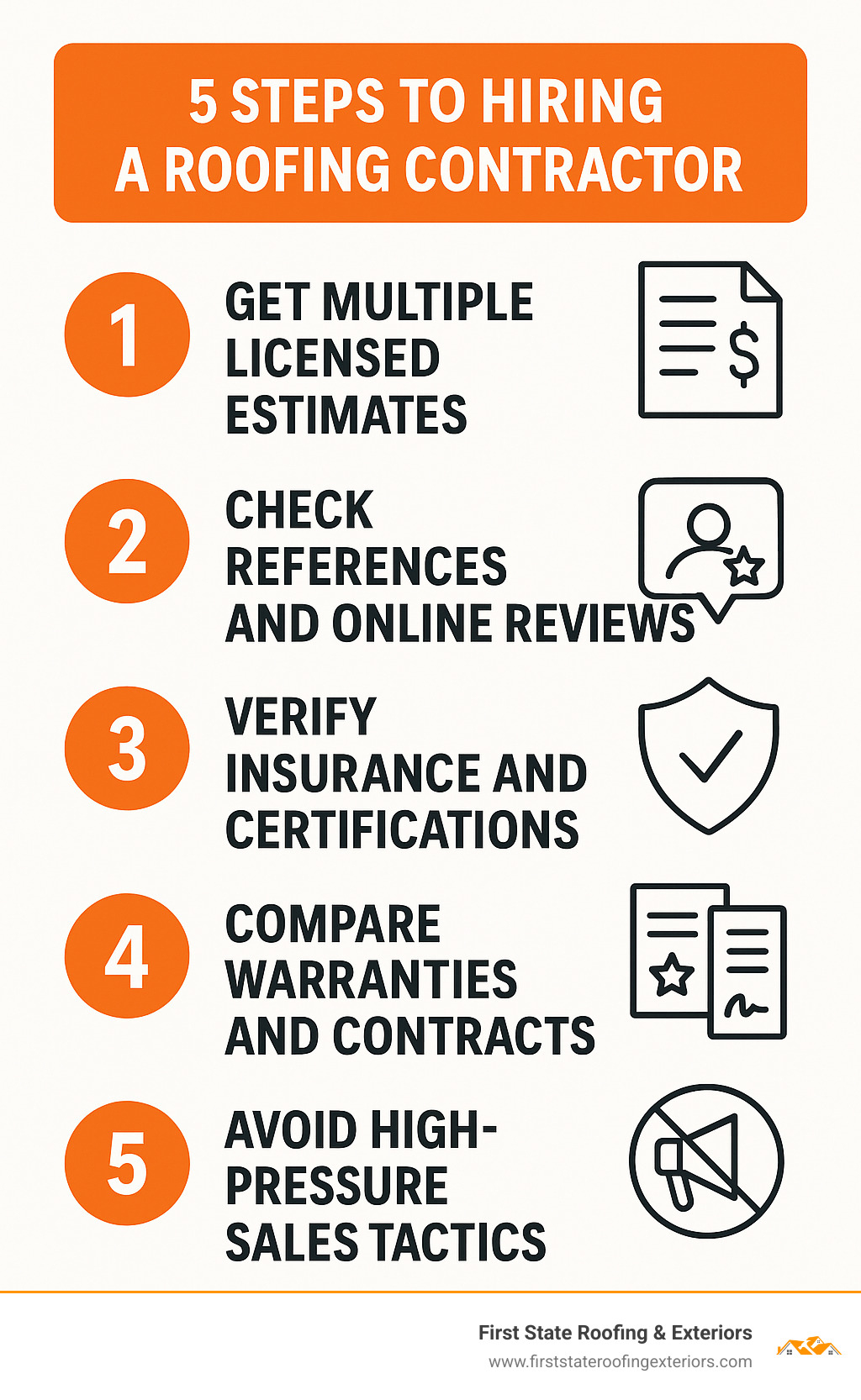
Step 1: Assessing Your Roof’s Condition and Needs
Before you find a roofer, you need to understand your roof’s condition. Knowing the symptoms helps you have a more productive conversation with a professional and get more accurate estimates.
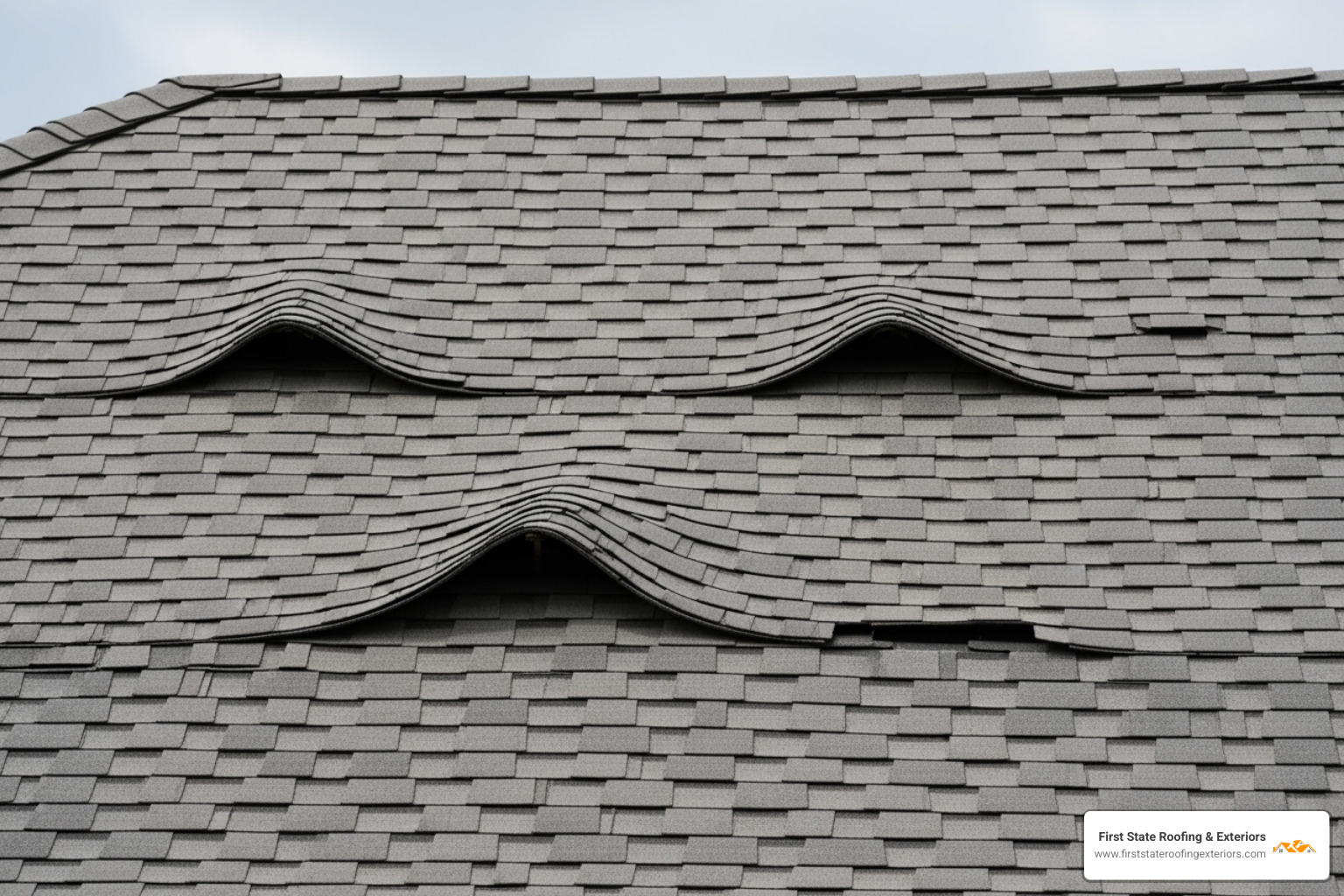
Most asphalt shingle roofs last 20-25 years, but weather can shorten that lifespan. Here are key signs that your roof needs attention:
- Curling or Buckling Shingles: Curled edges or buckled centers indicate age and heat damage.
- Loose Granules: Finding sand-like granules in your gutters means your shingles are losing their protective layer and are vulnerable to UV damage.
- Water Stains: Brown spots on ceilings or walls are red flags for active leaks that can cause structural damage.
- Spongy Feel: If your roof feels spongy or bouncy when walked on (with proper safety precautions), the underlying decking is likely water-damaged.
- Visible Damage: After storms, look for missing shingles, hail dents, or debris.
- Attic Problems: Check your attic for dark streaks, water stains, or any visible daylight coming through the roof boards.
When to Repair vs. When to Replace
Deciding between repair and replacement can be tough. Minor, isolated damage from a storm may only require a targeted repair, which typically costs between $380 and $1,800. However, if your roof is approaching 20 years old, repairs might be a temporary fix for a larger problem. Widespread issues or frequent calls for repairs are strong indicators that it’s time for a replacement. A full replacement costs more upfront—usually $5,890 to $12,800—but provides peace of mind for the next two decades. A qualified contractor can provide a cost-benefit analysis to help you decide.
Proactive Maintenance to Extend Your Roof’s Lifespan
Simple maintenance can significantly extend your roof’s life:
- Clean Gutters Regularly: Prevents water from backing up under shingles and causing rot.
- Perform Seasonal Inspections: Walk around your property each season to spot any changes or damage.
- Trim Overhanging Branches: Reduces the risk of branches falling on or scraping your roof.
- Address Moss or Algae: These organisms trap moisture and accelerate shingle deterioration.
- Replace Damaged Shingles Promptly: Prevents small issues from becoming large, expensive problems.
Preparing for Storm Damage
Living in Delaware means preparing for storms. A well-maintained roof is your best defense. Before a storm, secure outdoor furniture that could become airborne projectiles and ensure gutters are clean. It’s also wise to know your insurance policy, including your coverage and deductible, before you need it. This makes the claims process much smoother if damage occurs.
Ready to get your roof assessed by professionals? Call (302) 222-4065 to schedule your free, no-obligation inspection and estimate. We’ll help you understand exactly what your roof needs.
Step 2: Your Search Plan: How to Find a Roofer You Can Trust
Once you’ve assessed your roof, the hunt begins to find a roofer who is both skilled and trustworthy. This step is all about effective vetting.
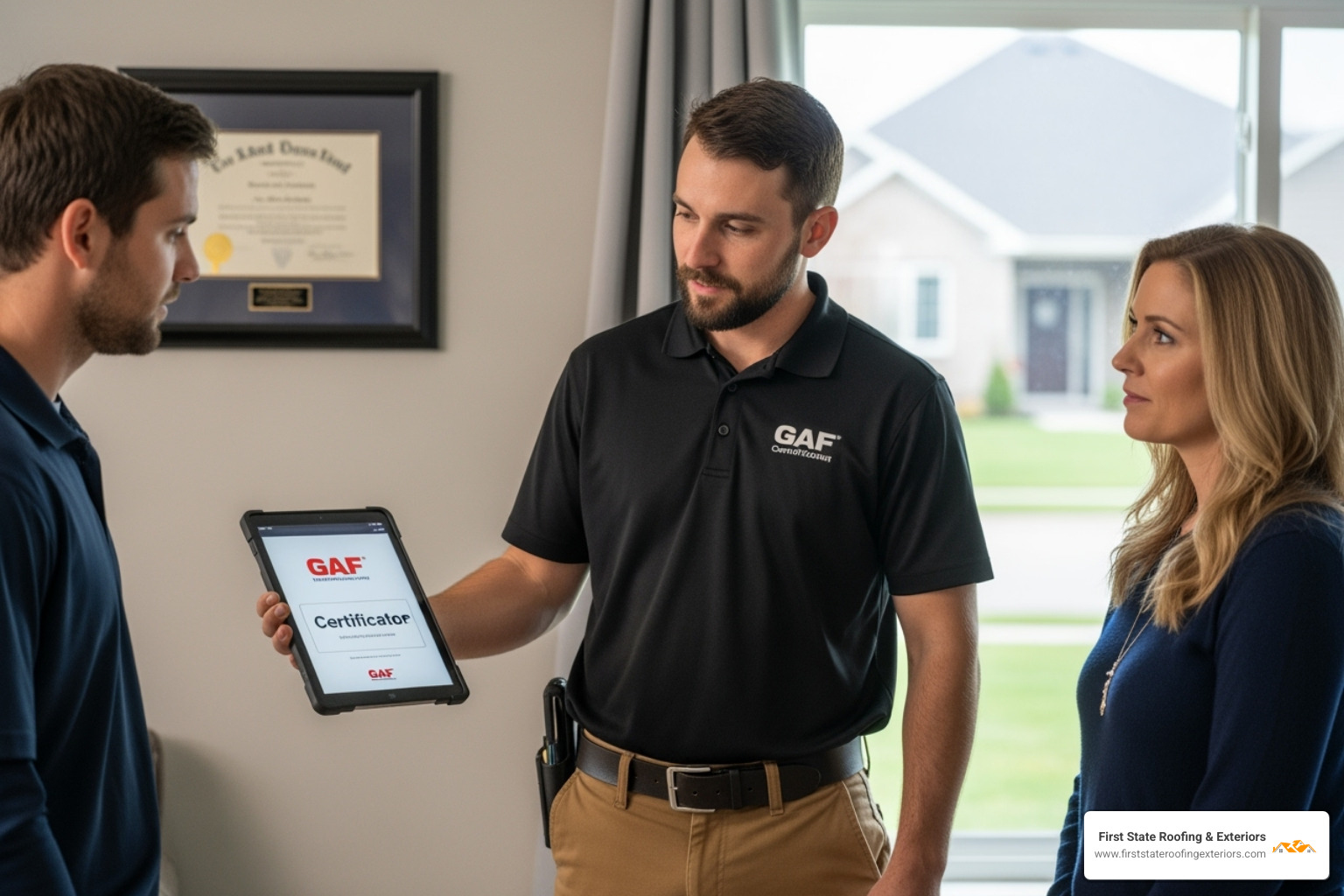
How to find a roofer using local and online resources
- Local Referrals: Ask neighbors, friends, and family for recommendations. Word-of-mouth is often the most reliable source, especially in close-knit communities like Seaford, DE, where reputations are built on quality work.
- Online Reviews: Use sites like the Better Business Bureau (BBB) and Angi. Look for BBB Accredited roofing contractors with high ratings. On other platforms, pay attention to how contractors respond to both positive and negative feedback.
- Manufacturer Certifications: Leading manufacturers like GAF certify contractors who meet specific training and quality standards. A certification often means the roofer can offer improved warranties. For example, you can get matched with contractors certified by GAF* in your area.
- Contractor Portfolios: Reputable roofers will have a portfolio of past projects on their website or available for review, allowing you to see their craftsmanship firsthand.
The Importance of Licensing, Insurance, and Certifications
These are non-negotiable credentials when you find a roofer:
- Licensing: Ensures the contractor meets state qualifications and understands local building codes. Always verify their license with your state’s licensing board.
- Liability Insurance: Protects your property from damage during the project.
- Workers’ Compensation: Covers the contractor’s employees if they are injured on your property, protecting you from liability.
- Manufacturer Certifications: While voluntary, certifications from brands like GAF indicate a commitment to quality and often open up access to superior warranties, such as the Golden Pledge® Limited Warranty. These certified contractors are independent businesses, not agents of the manufacturer, but their participation signifies a higher level of training and support. You can learn more about GAF’s program terms here.
Large Company vs. Small Local Contractor: What’s the Difference?
Choosing between a large company and a small local contractor depends on your priorities:
- Cost: Larger companies often have higher overhead, which can lead to higher bids. One homeowner reported quotes of $14k from a local roofer versus $20k from a large company for the same project.
- Resources: Large companies may have more crews and faster availability for big projects.
- Service: Smaller, local contractors often provide more personalized service, with direct access to the owner. Their reputation in the community is their lifeline, which is a strong motivator for quality.
Both can deliver excellent results. The key is to vet them properly regardless of their size.
Step 3: From Quotes to Contracts: Nailing the Vetting Process
With a shortlist of potential roofers, it’s time to get detailed quotes and ask the right questions. This is the most critical phase when you find a roofer.

Getting Multiple Estimates and Spotting Red Flags
Always get at least three itemized estimates. This protects you from overpricing and helps you compare what’s included. Don’t automatically choose the lowest bid; a rock-bottom price often means cut corners, subpar materials, or hidden fees. A legitimate quote will break down costs for materials, labor (typically 60% of the total), permits, and debris removal.
Be wary of these red flags:
- Large Upfront Payments: Never pay the full amount upfront. A reasonable deposit is 10-30%, with subsequent payments tied to project milestones.
- High-Pressure Tactics: Avoid anyone demanding an immediate decision with a “special price” that expires soon.
- Storm Chasers: Be cautious of out-of-state contractors who appear after storms. Many perform shoddy work and disappear, leaving you with no recourse.
- “Too Good to Be True” Prices: Significantly low bids often indicate unlicensed labor, inferior materials, or a scam.
Crucial Questions to Ask Every Potential Roofer
A professional will welcome your questions. Be sure to ask:
- Can I see your license and proof of insurance? (Then verify them independently.)
- Do you use subcontractors? Are they also insured?
- Can you provide references from recent customers?
- What is your process for protecting my property and cleaning up debris?
- Will you perform a complete tear-off of the old roof?
- What is the projected timeline for my project?
Decoding Roofing Estimates and Warranties
Roofing costs are driven by size, pitch (steepness), complexity (skylights, chimneys), and material choice. Typical repairs range from $380 to $1,800, while full replacements average $5,890 to $12,800. A comprehensive quote should include all potential costs, including permits and dumpster fees.
When comparing bids, focus on value, not just price. A solid warranty is a key part of that value. Look for two types:
- Material Warranty: From the manufacturer, covering defects in the shingles.
- Workmanship Warranty: From the contractor, covering installation errors. A quality roofer will offer this for 2-10 years or more.
For the best protection, ask about manufacturer-backed improved warranties, like those offered by GAF through certified contractors. These cover both materials and labor for extended periods and are often transferable, adding value to your home.
Step 4: The Nitty-Gritty: Roofing Materials and Insurance Claims
Once you find a roofer, you’ll need to select materials and, if necessary, steer an insurance claim. These decisions impact your home’s protection, appearance, and budget for years.
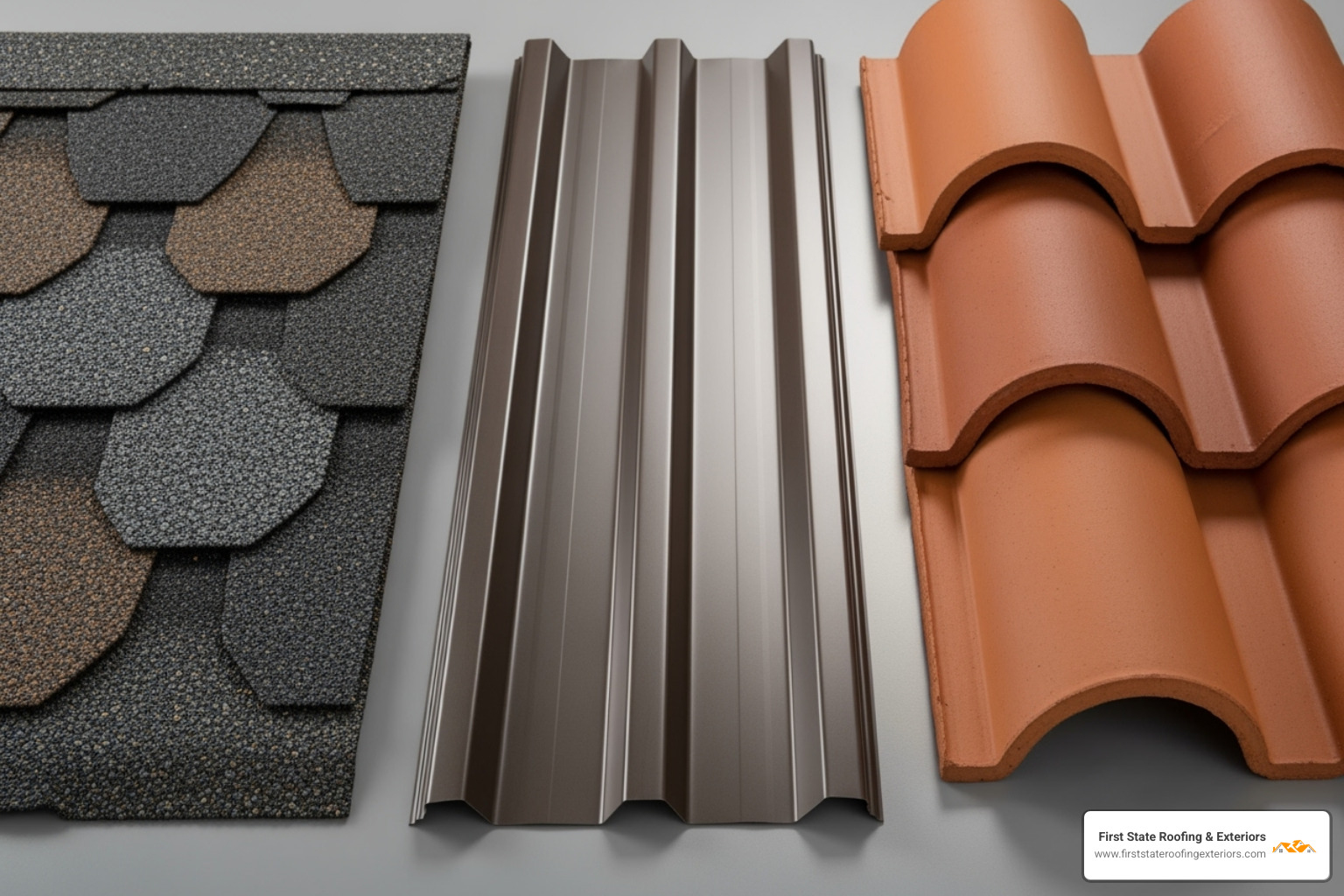
Choosing the Right Roofing Material for Your Home
Consider durability, cost, and style when choosing materials. Delaware’s humid, stormy climate favors materials that handle moisture well.
- Asphalt Shingles: The most popular choice due to their affordability and versatility. They offer a 20-25 year lifespan and are a great balance of cost and performance for most homes.
- Metal Roofing: Highly durable (50+ years), energy-efficient, and available in many styles. The upfront cost is higher, and installation requires specialized expertise.
- Tile Roofing: Offers exceptional longevity (50+ years) and curb appeal but is heavy and brittle. Your home’s structure may need reinforcement.
- Wood Shakes: Provide natural beauty but require significant maintenance to prevent rot and insect damage. Fire codes may restrict their use.
To help visualize your options, you can download a comprehensive guide for shingle styles and colors.
Navigating an Insurance Claim for Storm Damage
If a storm damages your roof, a clear process can reduce stress.
- Document Everything: Once it’s safe, take clear photos and videos of all damage, from missing shingles to interior water stains.
- Contact Your Insurer: Report the claim promptly, usually within 24-48 hours, to get a claim number and start the process.
- Make Temporary Repairs: Tarp damaged areas to prevent further water intrusion. Keep all receipts for emergency materials.
- Meet the Adjuster with Your Roofer: Schedule your chosen contractor to be present during the insurance adjuster’s inspection. A roofer can point out damage the adjuster might miss and advocate for necessary repairs.
- Understand Your Policy: Know your deductible and whether your policy covers full replacement cost or actual cash value (which includes depreciation). A reputable roofer understands insurance procedures and can provide the detailed estimates needed for a smooth claim approval.
Frequently Asked Questions about Finding a Roofer
When homeowners start to find a roofer, the same questions often arise. Here are concise answers to the most common concerns from my 20+ years of experience in Delaware.
How much does a typical roof replacement cost?
On average, a roof replacement costs between $5,890 and $12,800. However, this can vary widely based on your roof’s size, pitch (steepness), complexity, and the materials you choose. A larger home with premium materials could see bids ranging from $14,000 to over $20,000.
How long does an asphalt shingle roof last?
A professionally installed asphalt shingle roof typically lasts 20-25 years. Longevity is influenced by factors like Delaware’s coastal climate, the quality of the installation, and whether you perform regular maintenance like keeping gutters clean and replacing damaged shingles promptly.
What is the difference between a roofer being licensed and certified?
This is a key distinction when you find a roofer:
- Licensing is a mandatory legal requirement from the state. It proves the contractor meets basic qualifications and understands building codes. It is non-negotiable.
- Certification is a voluntary credential from a manufacturer (like GAF). It indicates specialized training on specific products and installation methods. Certified contractors can often offer superior, manufacturer-backed warranties that cover both materials and labor.
For the best results, choose a contractor who is both licensed and certified. It’s your best assurance of quality work and long-term protection.
Ready to start your roofing project with confidence? At First State Roofing & Exteriors, we’re licensed, insured, and GAF certified. Call us at (302) 222-4065 to schedule your free, no-obligation inspection and estimate.
Conclusion
The journey to find a roofer doesn’t have to be overwhelming. By assessing your needs, thoroughly vetting candidates, and asking the right questions, you can confidently select a contractor who will protect your home for years to come.
You now understand the importance of checking for licensing, insurance, and certifications. You know how to compare estimates based on value, not just price, and the importance of a solid warranty. By following the strategies in this guide, you can avoid common scams and find a professional who has your best interests at heart.
For Delaware homeowners seeking a trusted, family-owned expert, First State Roofing & Exteriors combines local knowledge with a commitment to quality and transparency. We understand that your roof is more than just shingles and nails—it’s peace of mind for you and your family.
If you’re ready to move forward with confidence, learn more about our comprehensive roof replacement services or call us at (302) 222-4065 for a free estimate and inspection. Take the first step toward a durable roof that will protect your home for decades.
